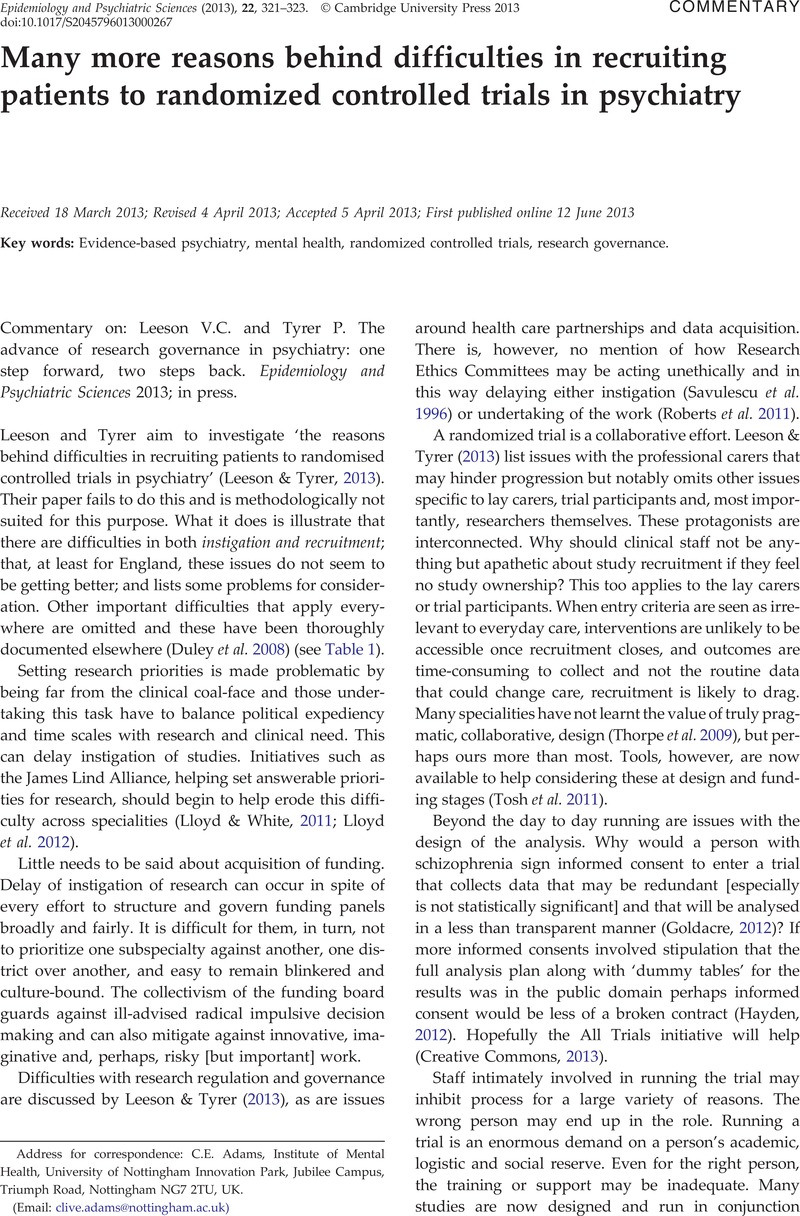Crossref Citations
This article has been cited by the following publications. This list is generated based on data provided by Crossref.
Purgato, M.
and
Cortese, S.
2014.
Does psychostimulant treatment in children with ADHD increase later risk of substance use disorder?.
Epidemiology and Psychiatric Sciences,
Vol. 23,
Issue. 2,
p.
133.
Hughes-Morley, Adwoa
Hann, Mark
Fraser, Claire
Meade, Oonagh
Lovell, Karina
Young, Bridget
Roberts, Chris
Cree, Lindsey
More, Donna
O’Leary, Neil
Callaghan, Patrick
Waheed, Waquas
and
Bower, Peter
2016.
The impact of advertising patient and public involvement on trial recruitment: embedded cluster randomised recruitment trial.
Trials,
Vol. 17,
Issue. 1,
Kenning, Cassandra
Lovell, Karina
Hann, Mark
Agius, Raymond
Bee, Penny E
Chew-Graham, Carolyn
Coventry, Peter A
van der Feltz-Cornelis, Christina M
Gilbody, Simon
Hardy, Gillian
Kellett, Stephen
Kessler, David
McMillan, Dean
Reeves, David
Rick, Joanne
Sutton, Matthew
and
Bower, Peter
2018.
Collaborative case management to aid return to work after long-term sickness absence: a pilot randomised controlled trial.
Public Health Research,
Vol. 6,
Issue. 2,
p.
1.
Pinfold, Vanessa
Cotney, Jessica
Hamilton, Sarah
Weeks, Craig
Corker, Elizabeth
Evans-Lacko, Sara
Rose, Diana
Henderson, Claire
and
Thornicroft, Graham
2019.
Improving recruitment to healthcare research studies: clinician judgements explored for opting mental health service users out of the time to change viewpoint survey.
Journal of Mental Health,
Vol. 28,
Issue. 1,
p.
42.
Parsons, Vaughan
Juszczyk, Dorota
Gilworth, Gill
Ntani, Georgia
McCrone, Paul
Hatch, Stephani
Shannon, Robert
Henderson, Max
Coggon, David
Molokhia, Mariam
Smedley, Julia
Griffiths, Amanda
Walker-Bone, Karen
and
Madan, Ira
2021.
A case management occupational health model to facilitate earlier return to work of NHS staff with common mental health disorders: a feasibility study.
Health Technology Assessment,
Vol. 25,
Issue. 12,
p.
1.
Parsons, V
Juszczyk, D
Gilworth, G
Ntani, G
Henderson, M
Smedley, J
McCrone, P
Hatch, S L
Shannon, R
Coggon, D
Molokhia, M
Griffiths, A
Walker-Bone, K
and
Madan, I
2023.
Developing and testing a case-management intervention to support the return to work of health care workers with common mental health disorders.
Journal of Public Health,
Vol. 45,
Issue. 2,
p.
e285.



